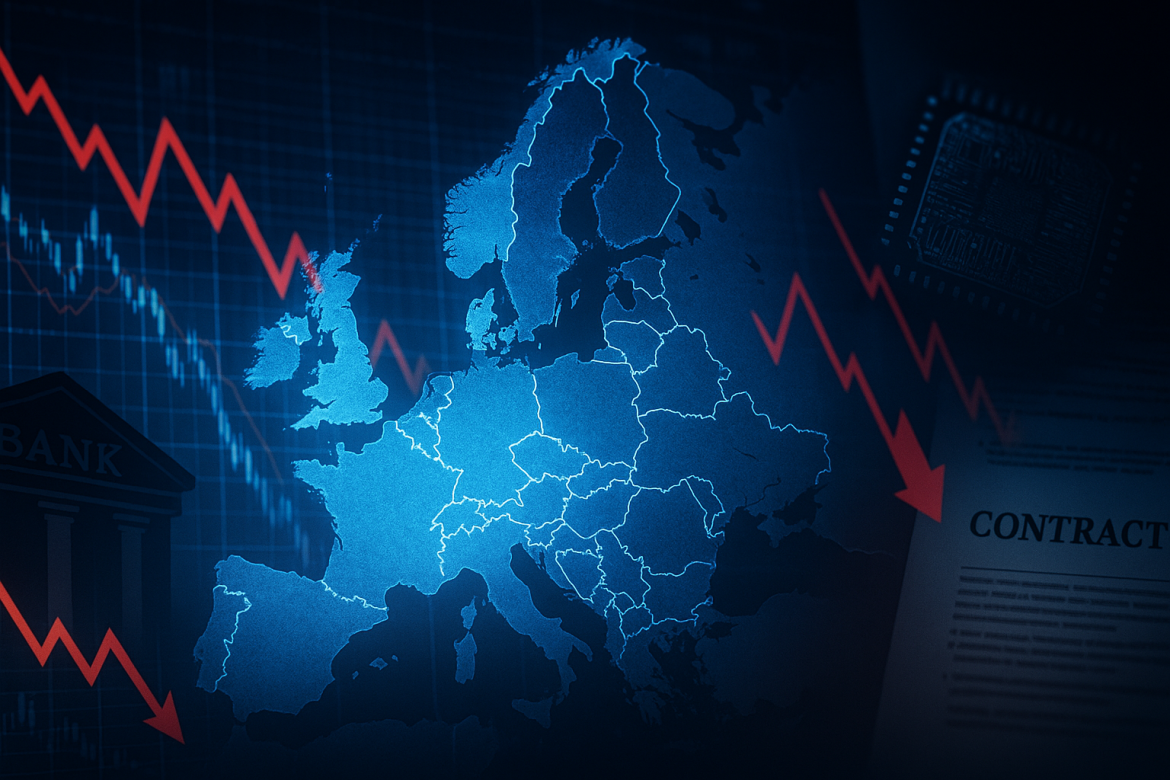Markets across Europe are on edge as a mix of economic pressures, legal battles, and supply chain strains shapes the region’s business landscape.
From a sharp FTSE sell-off and mounting risks in the banking sector to HP’s high-stakes Autonomy fight and the auto industry’s ongoing chip crunch, the latest developments highlight how fragile confidence remains.
Investors and companies alike are navigating slowing growth, regulatory pressure, and global disruptions that continue to ripple through key industries.
A glance at the major developments in Europe today.
FTSE slumps amid global sell-off
London stocks took a hit on Tuesday, sliding as global markets sold off and worries lingered about whether the Federal Reserve would actually move forward with rate cuts.
High company valuations didn’t help either.
The FTSE 100 fell about 1.3%, marking its fourth straight day in the red, the longest losing streak since August, as investors became more cautious and some cashed in profits, especially in financial stocks.
Miners and financial firms were among the hardest hit, while concerns about a slowing housing market and the upcoming UK budget added to the nervous mood.
Overall, the drop shows that investors are getting more skeptical about how long the recent market rally can last, especially with mixed economic signals coming in from around the world.
ECB warns of rising bank risks
The European Central Bank is sounding the alarm: Europe’s banks are dealing with some of the toughest risk pressures they’ve ever seen.
The ECB says ongoing economic uncertainty, from stubborn inflation to global tensions, is putting real strain on the financial sector.
Banks are facing growing credit risks as lending becomes harder and the economy slows, raising the chances that more borrowers could default.
On top of that, regulators are tightening the screws, pushing banks to build up stronger capital buffers in case things get worse.
Overall, the ECB’s message is clear: Europe’s banking system needs to stay sharp and resilient.
With markets on edge and economic headwinds picking up, there’s a real concern about how well the sector can hold up if conditions deteriorate further.
HP pursues $18B Lynch claim
HP is going after an $18 billion claim against the estate of Mike Lynch, tied to the long-running fallout from its acquisition of the UK software company Autonomy.
The dispute goes back to HP’s 2011 purchase of Autonomy, which Lynch founded.
HP says the company’s finances were misrepresented at the time, leading to a massive write-down not long after the deal closed.
It’s one of the biggest post-merger legal claims in UK corporate history, and it really underscores how tricky and risky big tech acquisitions can be.
The case is a reminder that even with due diligence, companies can still face huge financial and reputational consequences when a deal goes wrong.
Chip shortage still stalls automakers
The global auto industry is still wrestling with major disruptions from the semiconductor chip shortage, even as we move through 2025.
While things have improved since the worst of the crisis, big automakers like Bosch, Ford, Volkswagen, and Toyota are still dealing with production slowdowns because chips just aren’t available in the quantities they need.
The shortage hasn’t gone away because a bunch of factors are piling up: demand for chips is sky-high thanks to electric vehicles and AI data centers, which are competing for the same limited supply.
Geopolitical tensions, especially around key suppliers like Nexperia, are making chip exports more complicated. And on top of that, there’s only so much foundry capacity for the specialized, safety-focused chips used in cars.
The post Europe bulletin: stock markets slide, banking risks rise, HP’s $18B fight escalates appeared first on Invezz
